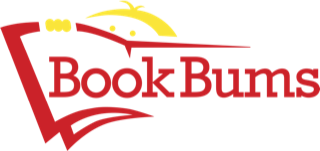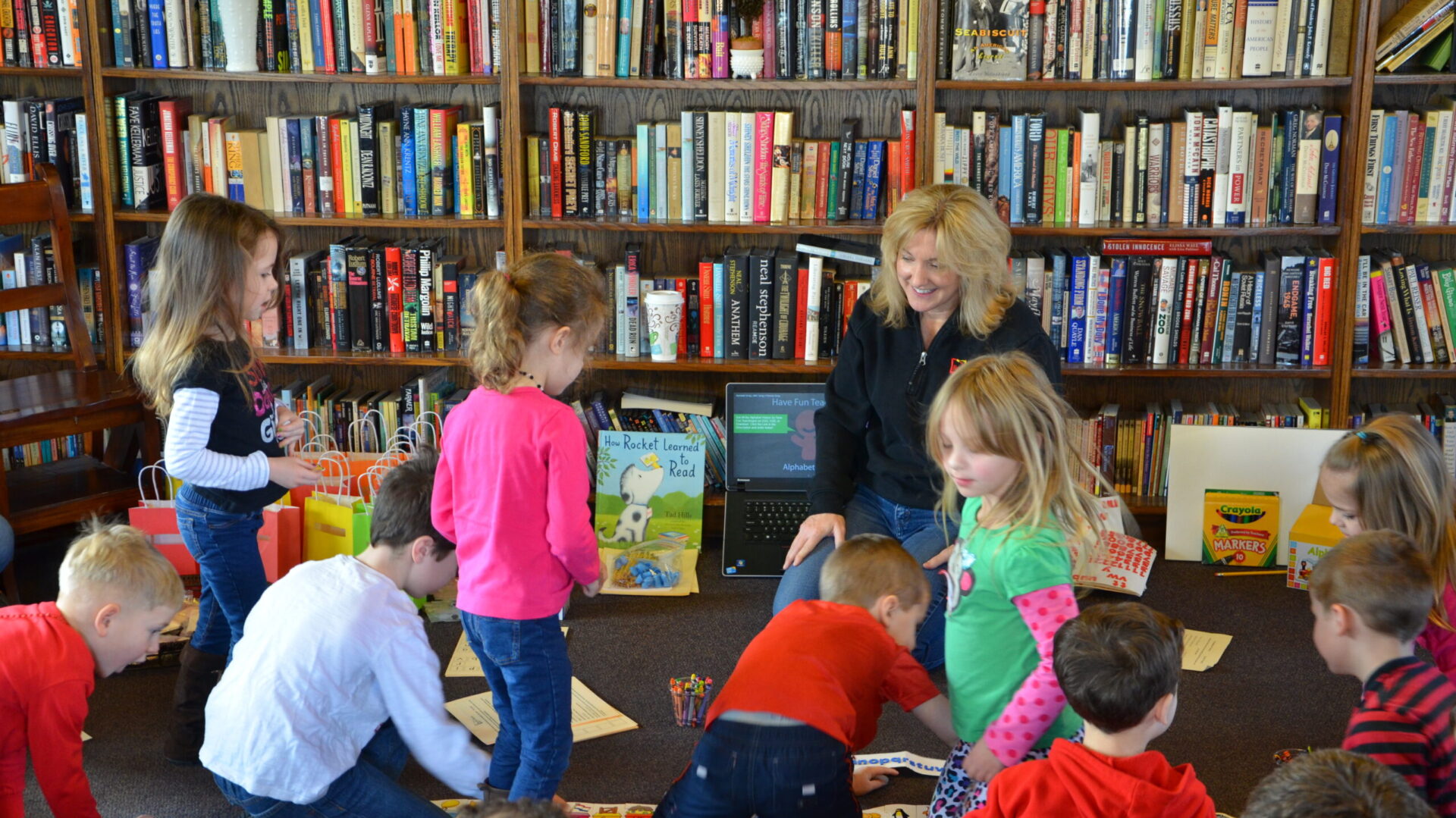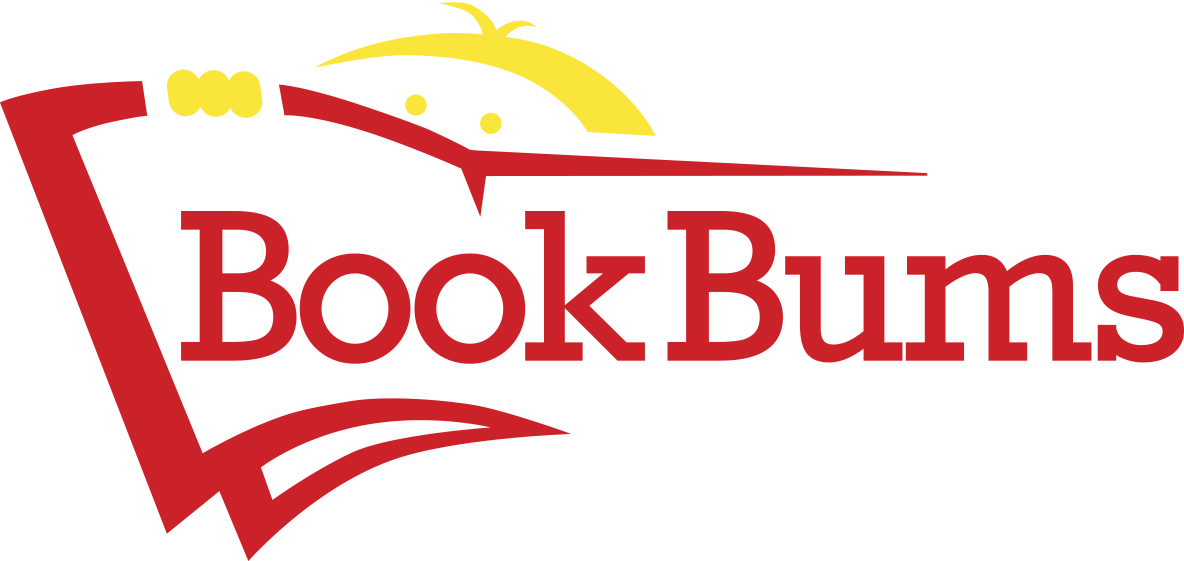
Hello Book Bums families!
This week in the newsletter we are thinking about labor - the act, the holiday and the word. We hope you get a chance to rest from your labors and enjoy your family and a good book!

Bookbums.com is an Amazon Associate; We earn from qualifying purchases. This means that if you click on a link to Amazon.com and make a purchase, We may earn a small commission at no extra cost to you. We do recommend the products. Feel free to find them by other means.
Word of the Week
collaboration (cuh-lab-or-ray-shun) noun/person, place, or thing - the act of working together with someone, a joint endeavor
The theater performance in the park was a collaboration of actors, musicians, and park managers.
Literary Calendar
• September is National Library Card Sign-Up Month.
• Even young kids can have their own library cards and can practice choosing and checking out their own books.
• September 6 is National Read a Book Day. Need we say more?
• So put your library card to good use and get reading!
"I have found the most valuable thing in my wallet is my library card."
-Laura Bush, former First Lady of the U.S.
From our Bookshelves
Brave Girl: Clara and the Shirtwaist Makers’ Strike of 1909, by Michelle Markel is a great book to share on Labor Day, which we’ll celebrate this year on Monday, September 5th. Labor Day is on our calendars to remind us to pay tribute to the achievement and contributions of American workers. Though, today, Labor Day is most often celebrated with picnics and parades that serve as a final farewell to summertime, the holiday originated in some of our nation’s most dismal times. In the late 1800s, during the peak of the Industrial Revolution, many Americans worked twelve-hour days, seven days a week, and earned minimal wages. Children as young as five or six could be found working in mills that were operating under what could only be described as inhumane conditions. Brave Girl is a true story about a young immigrant, Clara Lemlich, who would not stand by to watch women and children being treated unfairly. This young woman, fed up with the mistreatment of fellow laborers, helped women stand together and fight for what was right.
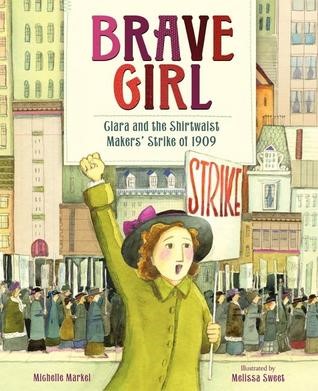
Tips for Readers and Writers
Thank a community worker! Provide some engaging writing supplies and invite your kids to write thank-you* cards for workers who help your family (teachers, postal service workers, delivery people, librarians, etc.). While you’re writing notes, be sure to include the words Thank you.
Phonics Rule to Note:
There are three nasal sounds in American English. They are /m/, /n/, and /ng/. These are the only three sounds that make our noses buzz when we make the sounds aloud. (Go on. You know you want to try it!)
To help kids correctly produce these sounds you can remind them that the two humps in the m remind us to put our two lips together to make the sound /m/. It’s almost like humming.
To make the sound for n, we point our tongues, inside our mouths, up toward our noses and make the sound /n/.
To make the sound for n-g, we have an open mouth with our tongue lifted only in the very backs of our throats. The best way to hear the sound is to say the word sing and hold on to that last sound. It’s an odd ball, for sure.
In words with a-n-k, like thank we have that same nasal sound /ng/ even though there is no g and there is a k, instead. As you’re showing your kids how to spell thank, note that the n-k (and the n-g) makes the a say its name. (thank, ankle, bank, cranky, gangplank, etc.)
If you’re feeling really inspired, you can even have your kids make a bin like this one for the delivery people who serve your family.
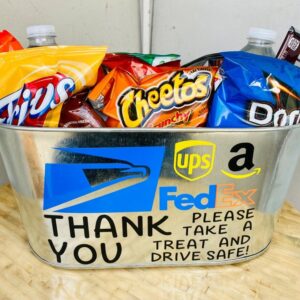
Picture from Etsy, LeatherandLettersCo
If you’re like me, you might be thinking that this tin tub should say “Drive safely!” I have learned that both “Drive safe!” and “Drive Safely!” are correct in this instance. Evidently there are words called flat adverbs. These are adverbs that are widely accepted without the typical l-y.
Consider these flat adverbs:
See you soon!
Time goes so fast.
Dress smart.
Tips for Families
On Labor Day, many of us will not be going to work. The kids won’t be going to school. It’s a great time to talk about downtime. Consider asking your kids if they are feeling exhausted by the start of this new school year along with the beginning of any sports, scouts, and/or other activities. Discuss the importance of having times set aside to rest. Ensure that your kids are getting what they need. Is there actual downtime in your weekly schedule where your kids can just relax and enjoy some free play or rest time? Talk about how you might address any issues they bring to light.
Here’s one BIG tip: Downtime should not include screen time. Given a choice, overscheduling is better than lots of time vegging on the couch with a device. Sure, we’re all spending a bit of time on our devices, but this is not downtime that replenishes our attention and motivation and that encourages productivity and creativity.
Downtime that helps us to achieve at our highest levels includes activities such as exercising, reading for pleasure, taking a nap, learning a new sport, enjoying music, drawing, meditating, taking a course, learning a new language, watching a documentary, playing games, planning trips, volunteering, keeping a gratitude journal, getting outside, caring for plants and/or pets, calling a friend, and writing thank-you notes.
Wordology Workshop
• The Latin root labor means toil or work.
• Unusually, the whole root is a word in English with the same meaning.
• You can find labor in many other words including elaborate, laborious, belaboring, laboratory, and our Word of the Week, collaboration.
Practical Grammar
When talking about our kids, especially this time of year, we often discuss what grades they are in. Sometimes we hyphenate the words and sometimes we don’t.
Here are a couple examples:
My second-grade daughter is in Mrs. Smith’s class.
When my son was in second grade, he had Mrs. Smith, too.
Both the sentences are written correctly. Why does the first sentence require a hyphen?
We use a hyphen to join two or more words to form compound adjectives (describing words) that precede a noun.
The purpose is to differentiate the meanings of the words from what they’d have meant if they had been used separately.
It’s not my second (daughter number two) grade daughter. Second is used to describe the grade not the daughter. Second and grade are connected by that hyphen to make a single adjective.
*Note that thank-you cards, from Tips for Teaching Readers and Writers requires a hyphen because the thank-you is modifying the noun cards.
Read Free Kindle books with the Kindle app!
If you know someone who would benefit from our newsletter or tutoring at Book Bums, please share this email with them! Thank you.
Copyright © 2024 Book Bums, All rights reserved
Our mailing address is:
7967 Cincinnati-Dayton Road Suite L
West Chester, OH 45069
